Pawn has come frequently to London in the past decade, spending about six months here in that time. Along the way, one builds up a list of go-to venues when looking for new, edgy, fringy, performance. Arcola, Bunker, Menier Chocolate Factory, Pleasance, among them. Pleasance and Arcola stand out in this list in that they are a regular part of Fringe. Pleasance have a large and popular venue there every year. With their Caledonian Express program they are short-circuiting the old six-month process of bringing new work from Fringe to London stage.
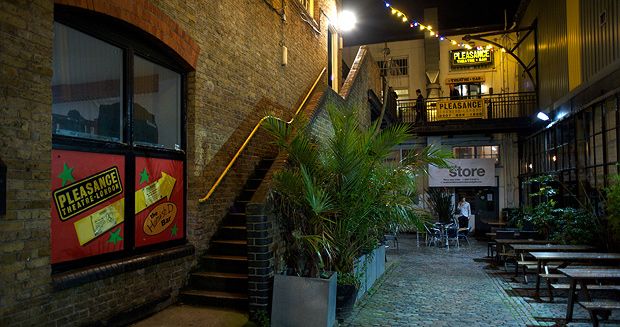
For those not familiar with the Edinburgh Festival Fringe, it’s a loosely organized (one of their founding by-laws is that there are no rules) annual showcase, running for most of the month of August. It’s become one of the foremost producer’s showcases in Europe, alongside events like ITS Festival (focusing on recent European arts academy grads) and has long been a critical component in bringing new works, performers and troupes to the stages and screens of the world (the popular television show Fleabag, for example, originated as a Fringe production).
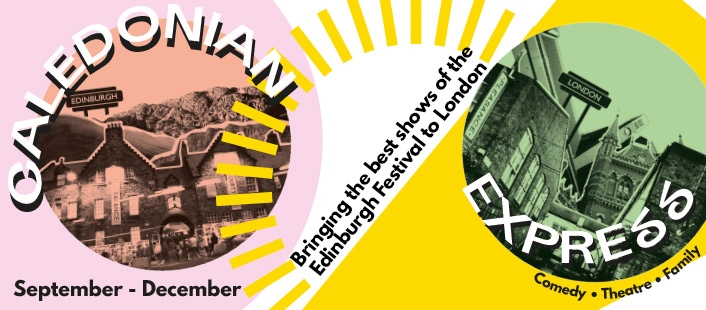
With Caledonian Express — so named for Pleasance’s North London venue, off of Caledonian Road — they are now presenting promising Fringe acts just a month or so after the festival. An act one sees during this phase is not really finished, per se. A full six month development cycle would lengthen many shows, refine them for a more formal theatre setting, things like that. In the Fringe, every act must find their own venue, many in tents or other pop-up spaces, with severe limitations of technical aspects, like lighting, sound, video, etc. And time. A Fringe piece is an hour long. That’s tradition. In many newer “fringe” festivals (outside the Edinburgh original) the rule is 50 or 55 minutes. To become a full-scale show, suitable for the stages of the world, much work is still needed.
Pleasance are a mainstay in that process, as are many other presenting venues throughout London; Battersea Arts Centre, The Bunker, Arcola, etc. These venues don’t just provide a space to perform, but they provide mentorship, connections, designers and the friendly surround artists need to make a successful transition to the stage.
Today brought Pawn back to Pleasance for the second time this trip, having seen the Edinburgh hit In Loyal Company here just the other day. First was a late matinee performance of The Oresteia, “… is a trilogy of Greek tragedies written by Aeschylus in the 5th century BC, concerning the murder of Agamemnon by Clytaemnestra, the murder of Clytaemnestra by Orestes, the trial of Orestes, the end of the curse on the House of Atreus and pacification of the Erinyes.” in the words of Wikipedia. In the hands of Splendid Productions, it’s hip-hop meets vaudeville by way of British music hall.
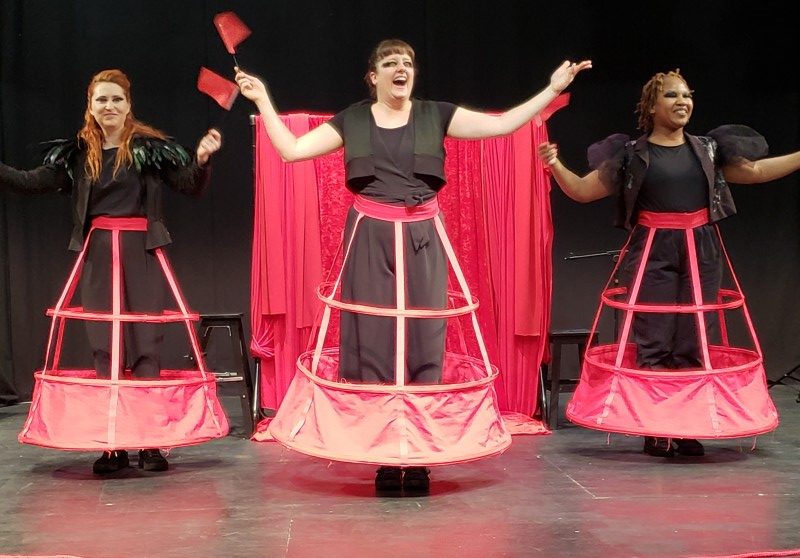
Three performers, Nuala Maguire, Grace Goulding, & Tanya Muchanyuka each perform multiple roles, starting with the Furies, whose role in the lives of men are marginalized by the events enacted in these three plays. Given the 60 minute time frame, the stories are severely shortened, as one might expect. The story telling was fast and furious (no pun intended) as we whipped through the background of all of the various murders, slights, infidelities, patricides, matricides, etc. Some of this involved a not-so-strong fast-forward/reverse conceit of fake reverse motion. One hopes that gets worked on, or eliminated.
All in all, most of the piece was strong. It moved along, had moments of great beauty, and got us involved (quite literally) in the story. It’s hard to flag individual performances, since the three women so often were acting in unison, but Macguire, as Clytemnestra, was exceptional. That she had arguably the best part certainly helped. But, too, she resisted mugging and gave some of the best straight performance of the show.
I saw this show with a handful of regular theatre goers, those one might expect in a late-afternoon (16:30) matinee, and about 150 schoolkids. The kids were a noisy bunch, but fully engaged by the music-hall aspects of the show, and not the least off put by the history.

Things would be different for A Clown Show About Rain, by Silent Faces. This small show was performed in the much smaller Downstairs venue, a small thrust space with minimal wings, no flies, and about 40 seats. Silent Faces is a female clown troupe – a rarity – with a sense of politics and a hopeful, optimistic mein. This show is a take on depression, but you wouldn’t know it for most of the hour.
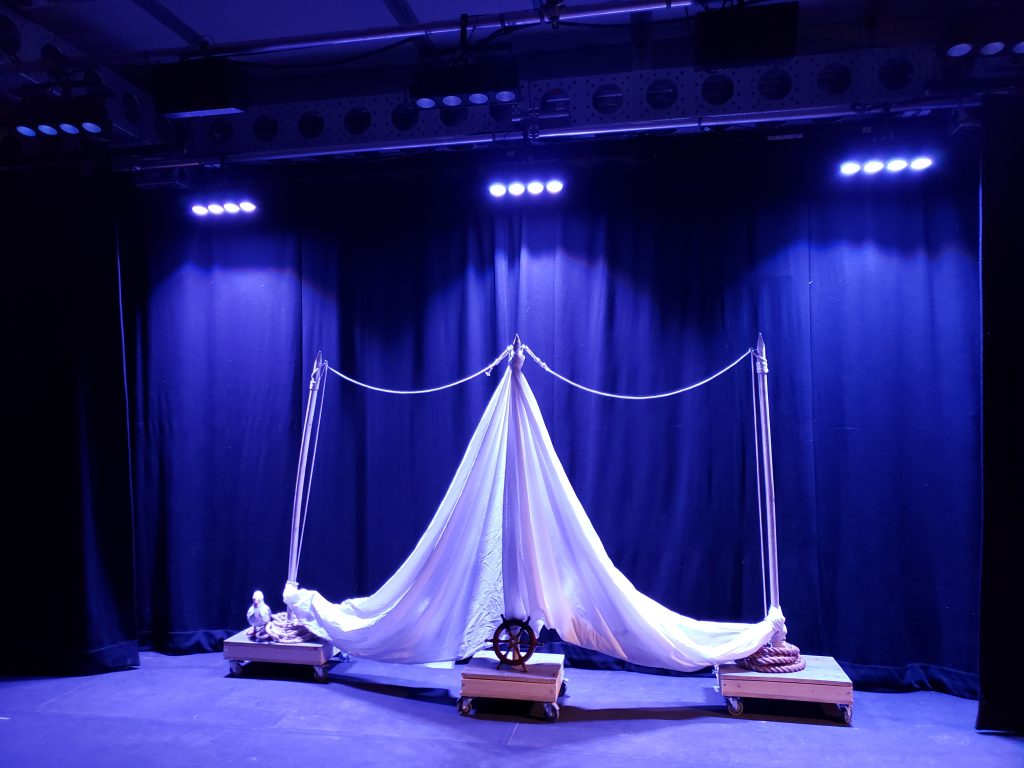
The performances are crisp and smooth. These women know how to share a stage with each other, and with five of them in such a small space, that’s no mean feat. Most of the time, however, it’s just two or three at a time. We have three sailors, or are they fisherwomen?, weathering a gale, in their macs, being blown to and fro, fighting over the ship’s wheel, or frantically trying to place buckets under an invisible leak.
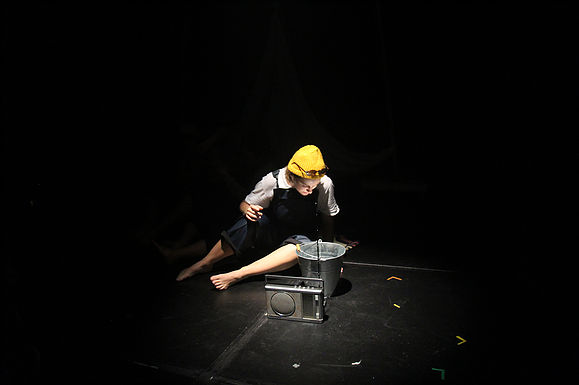
Or we have two mates, off fishing, having a light snack and listening to the shipping forecast on the BBC.
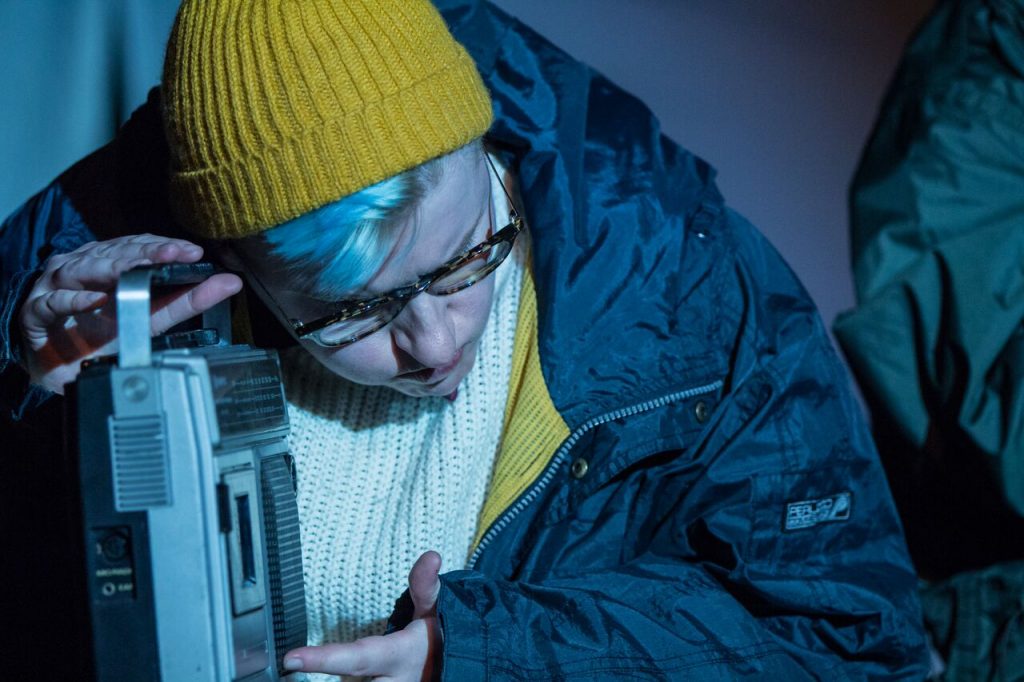
These may or may not strike you as funny, or potentially funny, situations, but Silent Faces find the humour.
And slyly, ever so slyly, they start to introduce the issues of mental health which lie at the heart of their work. We don’t see it at first, it may just be there on the fringe, but it’s there, and it’s devilishly clever. Given that this is mostly physical theatre, and very well done physical theatre, it’s intrinsically hard to describe. So I’ll take the coward’s way out and punt on that. I can tell you that there are moments of great beauty here, and striking pathos.
